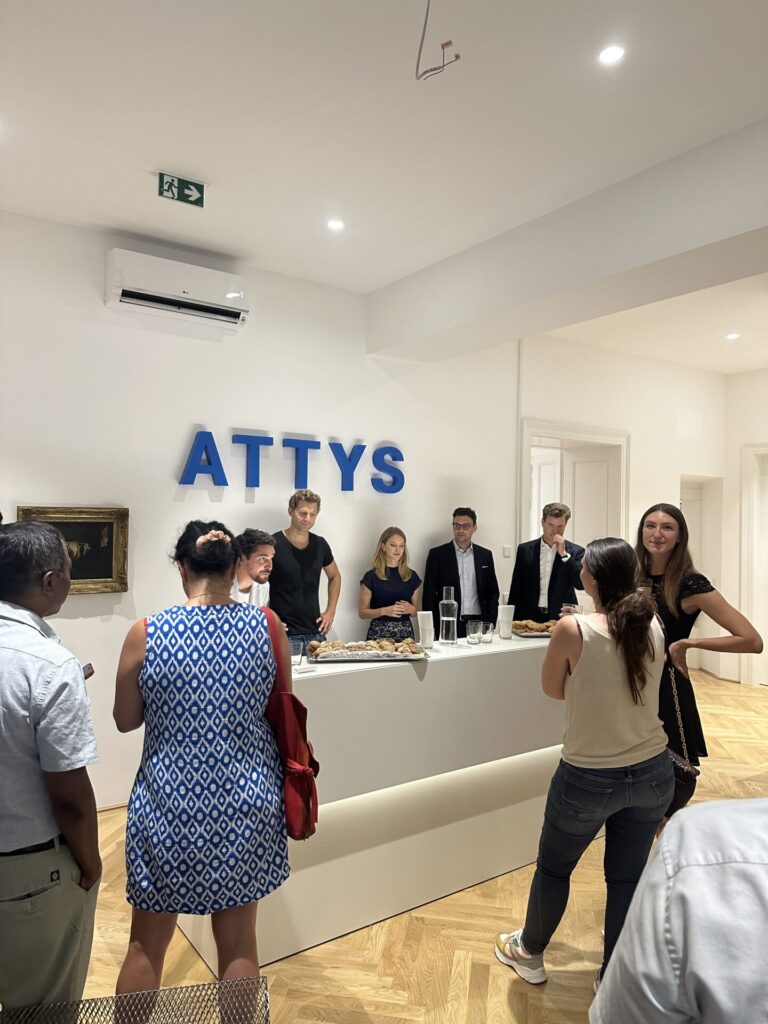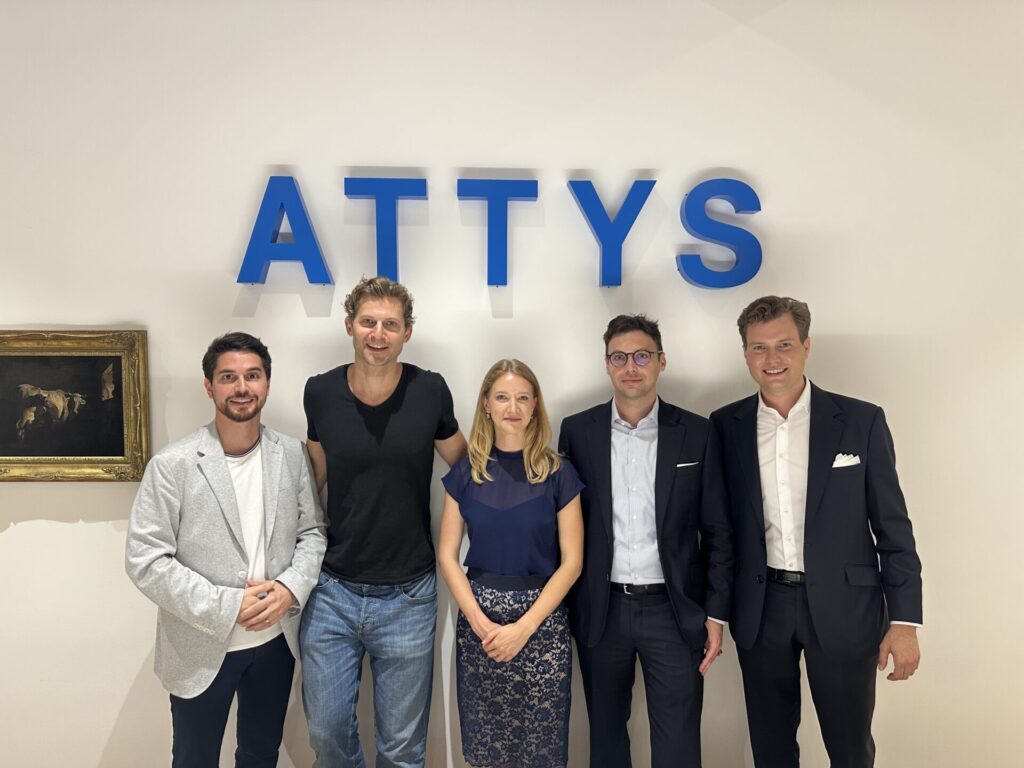Startup Law Lab. Volume I: ‘Startup Insolvency’
The three founders of the law firm, Saskia Leopold, Christoph Ludvik and Martin Zikeli, invited guests to their newly occupied premises on 27 June 2024 to examine and discuss the sensitive issue of start-up insolvency.
The impulse
Insolvency is a topic that has been heavily stigmatised in the business world. In recent years, it has often been associated with the start-up scene. This was a good reason for the founders of ATTYS to choose this specific topic as the kick-off for their event series ‘Startup Law Lab’. Together with the startup service of the Austrian Federal Economic Chamber, represented by its head Kambis Kohansal-Vajagah, numerous startup founders were welcomed to discuss and question the topic of insolvency.
The evening was opened by Alexander Wellinger, CFO of goUrban, who reported on the situation of insolvency and how a restructuring process saved the company from imminent insolvency proceedings, restoring it to a functional and profitable business. However, through restructuring and significant reorganisation measures, which also included a significant downsizing of the goUrban team, the company was able to get back on track.
Then is a comprehensive overview from our ATTYS experts on the key aspects of insolvency:
What is insolvency and how does insolvency proceedings begin?
Insolvency proceedings begin upon application. This is often filed by a creditor who can prove that a company, the debtor, is insolvent. Insolvent within the meaning of the Insolvency Code means either inability to pay, i.e. no longer being able to pay all debts due, or over-indebtedness. A company is over-indebted if its liabilities (not only its due liabilities, including pension and severance payments, for example) exceed its assets at liquidation value minus equity. In addition to mathematical over-indebtedness, there must be a negative prognosis for the company’s continued existence, at least for one year, supported by concrete figures. If one of these two conditions is met, the company is considered to be materially insolvent.
The obligation of the debtor’s management to file for insolvency is linked to the existence of material insolvency. The management must immediately file for the opening of insolvency proceedings. In addition, a 60-day period begins during which the obligation to file for insolvency can be postponed by making suitable attempts at restructuring. At this point at the latest, it becomes essential to consult a solicitor, tax advisor and auditor.
Planning a renovation
In order to achieve a restructuring like goUrban, a concept must be drawn up that is legally and economically feasible. Legal aspects play a central role here: a comprehensive insolvency application, followed by an application for a restructuring plan or restructuring proceedings, negotiations with creditors and compliance with all legal requirements are crucial to ensure that a restructuring does not fall through again. A lawyer can assist in drawing up a legally sound restructuring plan that creates the best possible conditions for a successful restructuring. You can also rely on our expertise to provide your company with sound legal advice in times of crisis, but above all in the event of an impending crisis.
Liability for management?
If the management violates the above obligation to file for insolvency, they may be held personally liable. Damages incurred by creditors as a result of late filing, deterioration of the quota due to late commencement of proceedings, or concealment from new contractual partners. Therefore, be vigilant! The obligation to file for insolvency begins as soon as the material insolvency is objectively (!) recognisable, and strict standards are applied to the management. The management can also be held liable for payments made after the material insolvency has occurred that do not meet the objective standard of a prudent businessman.
Impact on shareholders
The insolvency of a limited liability company (GmbH) generally has no effect on the shareholders, except for the contribution to be made; they only have limited liability, which is often one of the main motives for setting up a company. The shareholders are only liable in extremely exceptional cases. In the case of an OG, the shareholders are liable without limitation for claims against the company, which means that the insolvency of the company often results in the insolvency of the shareholders.
IP rights in insolvency
IP rights can play a significant role in insolvency or impending insolvency. IP rights can be used to cover debts before and during insolvency by being sold, licensed or otherwise exploited. Insolvencies offer creditors and investors the opportunity to use or acquire these assets. Such rights can provide a strong bargaining position in negotiations with creditors, who are often willing to make concessions or accept restructuring plans in order to gain access to valuable IP rights that could generate future income. These opportunities in turn highlight that registering an IP right and setting up how it can be used can be vital for a company’s survival. Proper IP management is essential in order to fully utilise these assets.
Employment law in insolvency
The employer was given the option of reducing the number of employees during insolvency at times specified by law. This means that even if an employment contract is fixed-term or has a significantly longer notice period, it can be terminated in accordance with the statutory or collective agreement notice period. However, employees with special protection against dismissal, such as works council members or disabled persons, are exempt from this and the consent of the court must still be obtained. The deadline for registration in the AMS early warning system must also be observed in the event of insolvency.
Our recommendations at a glance:
- It should be emphasised that insolvency should not be seen as stigmatising, but rather as a last chance to save a sinking ship from capsizing, thereby achieving a better outcome for all involved than if liquidation were imminent and the company were to be saved.
- IP rights play a central role in the insolvency of a start-up. Careful management, strategic use and legal protection can make a decisive contribution to maximising the value of the start-up and increasing its chances of survival.
- Managing directors take note: it is better to submit the application early than to be exposed to liability later. Contrary instructions from shareholders are unlawful and do not have to be followed. The planning of restructuring attempts and the possible application for restructuring proceedings within the 60-day period should definitely be clarified with a solicitor.





